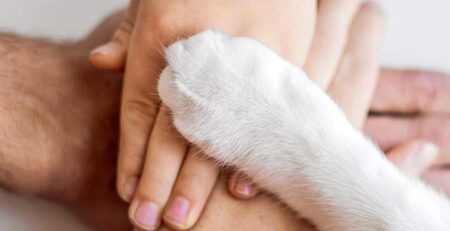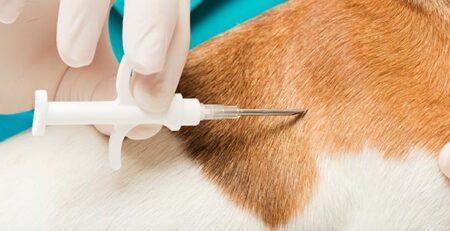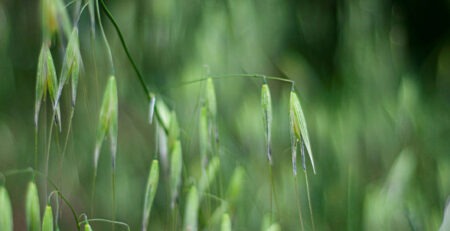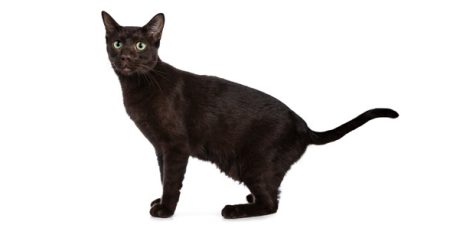Table of Contents
With the warm weather of spring, fleas and ticks invariably show up to infest dogs and cats
In spring the days are pleasantly warm and longer.
Favorable weather conditions induce and stimulate spending more time outdoors and in the company of our dogs.
But rising temperatures also encourage the reproduction and spread of the much-feared external parasites: fleas and ticks are lurking, ready to “colonize” dogs and cats.
Fleas and ticks: how they act and what they cause
Fleas, wingless, tiny and extremely fast insects, are hematophagous external parasites i.e., they feed on the blood of mammals and birds.
They creep into the thick fur of the animal at the base of which, moreover, they deposit their excrement, tiny dark-colored grains that irrefutably signal their presence.
Flea infestation can result in nefarious consequences in the animal: allergies, dermatitis, internal parasitosis, blood diseases.
Ticks, on the other hand, belong to a suborder of mites.
Hematophagous as well, they pierce the animal’s skin and attach themselves firmly to it, feeding on its blood.
They are capable of carrying pathogens of different natures (viruses, bacteria, protozoa) responsible for diseases that are dangerous to both animals and humans: Rickettsiosis andEhrlichiosis are among the best known and most fearsome.
They manifest as high fever, drowsiness, joint pain, loss of appetite, weight loss, and nervous and skeletal symptoms.
How to defend against fleas and ticks and reduce risks to dogs and cats
Prevention is the watchword.
Dogs and cats should be given flea and tick treatment throughout the year but even more scrupulously as early as the spring period.
More attention is required during the summer season.
Diligently adheres to monthly pesticide application and dosing intervals
There are many flea products available in pharmacies and specialty stores that are also active against ticks.
The most common can be found in the form of sprays, spot ons, shampoos and collars.
Spot ons, for example, are applied in the interscapular area, almost near the nape of the neck, so as to prevent the animal from licking itself.
They should be used at least one week after the last grooming, as they take advantage of skin fat to spread their effect.
The spray, on the other hand, is usually applied by spraying it on the hand (so be careful to wear gloves) and then massaging the product into the dog or cat’s skin.
Also contributing to the effectiveness of spot on and spray are flea collars, which are characterized by the slow-release action of the active ingredients, providing coverage ranging from 6 to 8 months.
Due to the presence of active ingredients such as deltamethrin precisely the anti-parasite collar can also be critical in protecting against the bites of pappatacio, the dreaded vector of leishmania.
Fleas, ticks and parasites
The pappatacio or phlebotomus is a very common insect in the Mediterranean area and particularly in Sicily.
Very similar to a small but silent mosquito, through its bite it can carry a virus that in humans causes a disease called “parrot fever” while to dogs it transmits Leishmaniasis.
It is a very insidious disease characterized by an incubation period that can last up to several years before manifesting itself overtly in the dog through its characteristic symptoms: dermatitis, weight loss, hair loss, ear lesions, nose bleeds, accelerated nail growth, eye lesions, and kidney failure.
Flea and tick prevention in the home as well
To prevent the proliferation of fleas and ticks, a thorough cleaning of the places in the house frequented by our pet, as well as the kennel and car, should be carried out.
This can be done by using room sprays.
These act by creating a “shield” against external threats and inhibit the larval development of the dreaded pests.
The latest sprays are generally based on essences and essential oils of flowers and plants and are effective:
– Lavender and geranium for mites and ticks
– Citronella, mint, eucalyptus and basil for mosquitoes
It is good to specify that the action of essential oils is repellent and NOT insecticidal so by themselves ARE NOT SUFFICIENT TO DEBELL PARASITES.
Always prevent at any time of the year
In summary, we could conclude by saying that at any time of the year and in any part of Italy, pest infestations should be prevented but judiciously, using chemical pesticides and natural remedies synergistically.
Remember that an animal in good health, properly fed and living in an ethologically healthy condition certainly has an immune system capable of responding more effectively even to vector-borne infectious diseases.
This does not detract, however, from the fact that the alertness against pests must always be highest.
Consult your Veterinarian about the proper use of repellent and abatement pesticides suitable for your dog or cat.
The veterinary doctors on our staff are always available for consultations and visits-book an appointment and get the right advice for your four-legged friend’s well-being.
We also remind you that in case of need and urgency, Clinica La Veterinaria is always open every day h24 including holidays and with First Aid service from 8 pm to 8 am.
For the joy of seeing them HAPPY.










